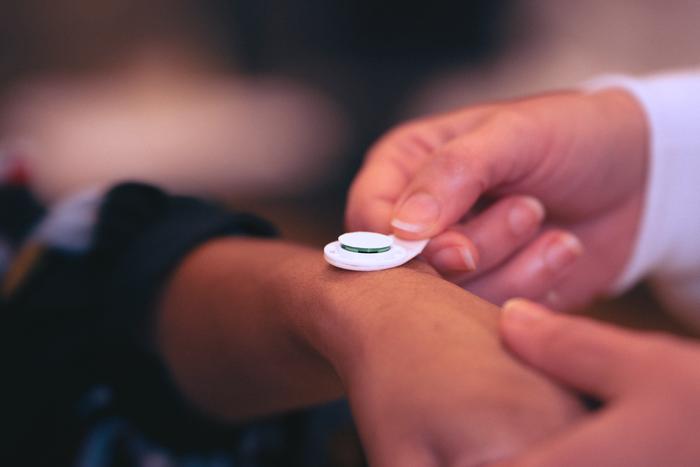In a groundbreaking advancement for public health, Emory University, in collaboration with Micron Biomedical, has initiated the first-ever clinical trial for a novel rotavirus vaccine—designated CC24—using innovative dissolvable microarray technology. This significant development allows for vaccine administration through a painless microneedle patch, positioning it as a trailblazer in vaccine delivery methods. The trial is now actively enrolling participants and is sponsored by the U.S. Centers for Disease Control and Prevention (CDC), marking a pivotal moment in the pursuit of enhanced vaccination strategies.
Rotavirus represents a leading cause of severe diarrheal disease in children worldwide, particularly in low- and middle-income countries. Current oral rotavirus vaccines have demonstrated lower efficacy in these regions, creating a gap in effective preventive healthcare. The novel CC24 vaccine, formulated by the CDC, aims to provide a more reliable alternative that circumvents the limitations of oral vaccinations, offering protection to populations that are most vulnerable.
Dr. Demetre Daskalakis, Director of the CDC’s National Center for Immunization and Respiratory Diseases, emphasizes the potential of this clinical trial as a groundbreaking initiative. It not only tests the safety of the CC24 vaccine but also explores the innovative ‘patch’ technology for vaccine administration. This represents a promising step in vaccinating against rotavirus, extending the reach of effective healthcare to communities where traditional methods have faltered.
The paradigm-shifting technology developed by Micron Biomedical streamlines the process of vaccine delivery. It employs a unique needle-free method that integrates dissolvable microarray compounds to administer vaccines painlessly into the skin’s upper layers. This innovation not only drastically improves the comfort of vaccination but also addresses logistical challenges associated with vaccine transport, primarily in regions lacking reliable cold chain infrastructure.
Micron Biomedical formulates vaccines to be more stable at various temperatures, thereby mitigating the necessity for rigorous cold chain requirements. The compact design of the patch enables individuals to self-administer their vaccines easily with a simple button press. Importantly, this technology produces no sharps waste, promoting safer disposal practices and enhancing public health efforts.
Dr. Christina Rostad, an associate professor specializing in Pediatric Infectious Diseases at Emory University and lead investigator of the trial, notes that despite existing oral vaccines, the efficacy in low- and middle-income countries remains suboptimal. This new trial aims to bolster scientific innovation towards life-saving healthcare solutions, supporting broader and more effective vaccine access not only globally but also within the United States.
The microneedle patch technology is particularly advantageous for populations adverse to needles due to its perceived non-invasive nature compared to traditional injections. This psychological barrier can significantly impact vaccination rates, particularly among children and adults who might forgo vaccinations due to fear of needles. The trial aims to provide critical insights into the viability and acceptability of this groundbreaking delivery method, reinforcing community participation in immunization initiatives.
This clinical trial builds upon previous explorations of Micron Biomedical’s technology, which has shown promise in delivering self-administered seasonal influenza vaccines. Studies have also indicated potential applications in vaccinations for diseases like measles and rubella, illustrating the versatility of this innovative approach to vaccine administration.
Steven Damon, CEO of Micron Biomedical, expresses enthusiasm for collaborating with Emory University and the CDC on this transformative initiative. He underscores that accelerating access to vital vaccines and therapeutics directly influences public health outcomes, particularly during times of epidemic and pandemic, as well as catering to the needs of military and national security applications.
As part of the trial’s goals, this phase I double-blind placebo-controlled study will analyze the safety, immunogenicity, and reactogenicity of the CC24 vaccine when delivered via Micron Biomedical’s microarray technology. The trial will recruit fifty healthy adults aged 18 to 45, with data generated here expected to inform future studies involving pediatric populations, propelling the research forward towards broader applications in children.
In summary, the initiation of this clinical trial heralds a new era in vaccine development characterized by innovative technologies that can transform the landscape of public health. The utilization of dissolvable microarrays not only stands to enhance the delivery of vaccines but also reflects a growing commitment to tackling pressing global health challenges, particularly in regions where traditional vaccine strategies have fallen short.
As this trial progresses, it may redefine how vaccines are perceived and administered, enhancing overall compliance and effectiveness. It also embodies a significant leap towards addressing inequities in healthcare access and ensuring that vulnerable populations receive adequate protection against infectious diseases.
This innovation in vaccine delivery paves the way for further research and development in the field, with the potential to revolutionize how the global health community approaches vaccination programs, ultimately saving countless lives and improving health outcomes worldwide.
Subject of Research: People
Article Title: Emory University and Micron Biomedical Launch Clinical Trial for Novel Rotavirus Vaccine Using Microneedle Patch Technology
News Publication Date: June 16, 2025
Web References: link to clinical trials
References: Lancet Study
Image Credits: Micron Biomedical




